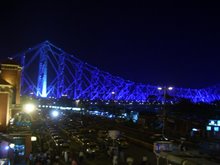On the occasion of IACM 2011, an article by Dr Sundaraman that needs wide circulation:THE Late 1980s were the dark ages of HIV in India. Dominic DeSousa was jailed in Goa for testing positive to HIV. The Courts in Chennai had incarcerated 8 HIV positive women from a remand home. Human rights were being violated. A young Lawyer from Mumbai and an Intelligent Journalist from Chennai who had no connections to HIV mounted a fight.
The courts were sane. Justice prevailed. Both cases stated that a person with infection or disease cannot be sent to Jail. Victory was celebrated as it created a new beginning. Those were the days when we had to explain even the acronyms HIV and AIDS. It was believed to be a disease of the west and probably imported by people with bad conduct.
The Director General of ICMR declared all foreigners should be tested. Somebody reminded him that the prime minister [ then Rajiv Gandhi] was married to a foreigner. Quickly the order was reversed.
People talked about HIV as a death warrant. HIV positive people lived a life in hiding while a few brave ones started speaking up. The discourse and dialogue on HIV had arrived.
From 1986 when HIV was first described in Chennai and later in Mumbai, for a few years there was only a surveillance program. That too in Tamil Nadu and Maharashtra since there was a general thinking that these are promiscuous states!!.
The 1990s saw a Government response, though lukewarm. It was not their fault. There was not much of knowledge and people who got HIV were anyway those from the gutters. Prejudice abounded.
Gradually, the acceptance that we need to do something came by on many people from the civil societies who were seeing the reality of this enigmatic disease that did not show up visibly and did not have a cure but manifested itself by people getting despondent and dying fast.
The response galvanized. The government constituted committees that included civil society to find a solution and the golden era of "India responding to HIV/AIDS" was born. By that time it was late 90s.
The level of mutual respect that civil society, people living with HIV and those communities at risk had and mandated to work together, was at its peak. Government office in Delhi saw the unique sight of Senior IAS officers at the level of Additional Secretary working shoulder to shoulder with Men Who have Sex With Men, Injection Drug Users, Female Sex Workers, social workers at Nirman Bhavan, the heart of the health ministry.
Strategies were drafted, plans were made, money was pledged and all the development partners walked the talk. Breaking the silence of HIV and torch bearing of the response were people at the helm of the National Program. There was a penance in progress. The country rallied around it. Every state showed their response, lives were being saved when dead were being buried.
The era of treatment arrived. The HIV positive people pushed. A political mandate proved that treatment can be offered and government can absorb the cost.
The National program was owned by everyone. The Third National Plan for HIV/AIDS called NACP III was born. Egalitarian and all inclusive value system pervaded. HIV is everybody's business was the mantra. We were all poised to see the impact. Soon we called the bluff of the experts saying India will go the Africa way.
People of India absorbed the impact of HIV. Families had sons, daughters, brothers, sisters, mothers, fathers, uncles, aunts and others die of AIDS. These were wasted lives.
Many lived on to fight the battle and by 2010 weknow that we have brought the epidemic under control. A job well done - celebration of true partnership of the Civil Society and the Government began. A partnership of trust, mutual respect, admiration for walking the last mile.
The epidemic is not over yet. Each day someone is getting infected. Each day someone is dying. 25 years has gone by and slowly the Government is getting into business as usual. You hear people say, "this is a health department, we can only do so much". There is no more a strategy contemplated for the new challenge of sustaining the gains of the last 25 years. The spirit of partnership is vanishing and contractual obligations are asked to be met. HIV is devious. It has suddenly found a way to divide and rule. The resurgence of the epidemic is a reality if we don't do it together and do it well. The lives lost are not for us to lose the battle in the long haul.
Dr.S.Sundararaman, Chennai
The Author has seen the epidemic and its response from 1986 till date.





